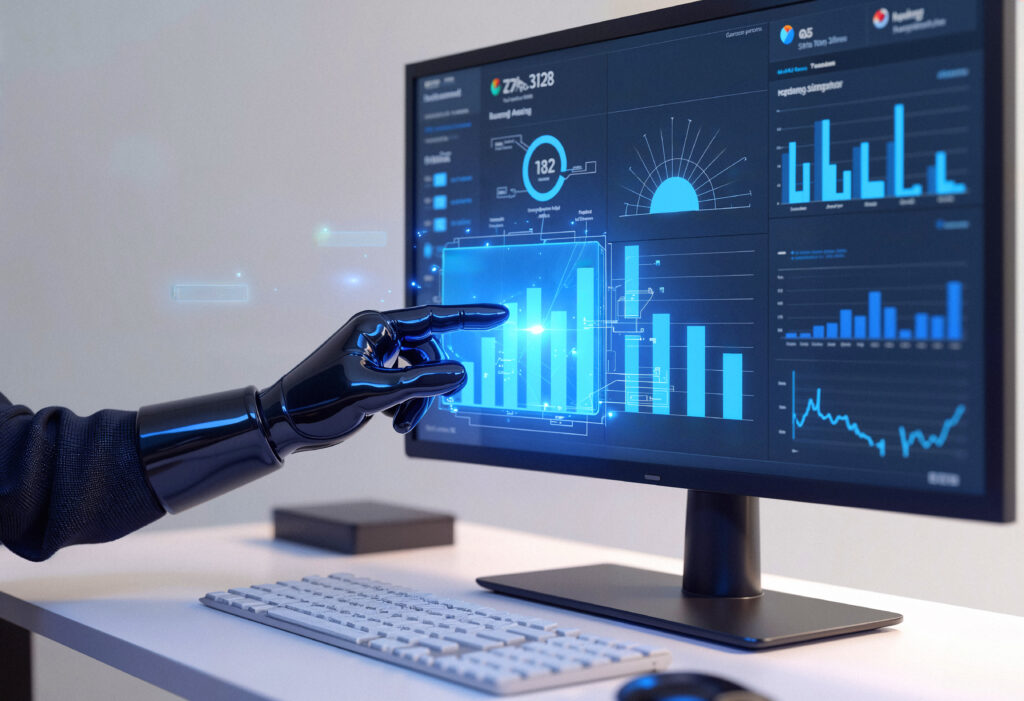Overview
Every month, we carefully curate a selection of AI startups that demonstrate strong potential through their novel approaches, technological breakthroughs, or unique applications. Our spotlight focuses not just on companies with impressive funding rounds, but on those creating tangible impact across diverse sectors—from healthcare and sustainability to enterprise solutions and creative technologies. In this month’s edition, we turn our attention to a remarkable collection of AI startups that have caught our eye.
1.Archetype AI

Archetype AI is advancing the field of “physical AI” with a proprietary foundation model designed to interpret real-world sensor data through natural language interfaces. The company’s core technology, a Large Behavior Model (LBM) named Newton, processes multimodal inputs—including video, radar, and accelerometer data—to uncover complex patterns and generate real-time insights into physical environments.
Newton converts raw sensor streams into a continuously updating universal embedding space. This allows for human-readable outputs such as text, code, or visualizations, accessible via natural language, speech, or gesture-based interaction. The company positions this approach as a critical enabler for industries reliant on situational awareness and real-time decision-making.
Application areas range from construction site safety and smart home automation to predictive maintenance in energy infrastructure and health monitoring via wearable devices. Notably, the company is collaborating with major industry partners, including construction firm KAJIMA, to apply its models in real-world environments such as infrastructure reconstruction.
Archetype AI’s research suggests that Newton can encode and generalize physical behaviors without explicit programming of physical laws. As demand for real-time sensor intelligence grows, the company’s approach offers a framework for bridging AI and physical systems at scale.
2.SambaNova Systems
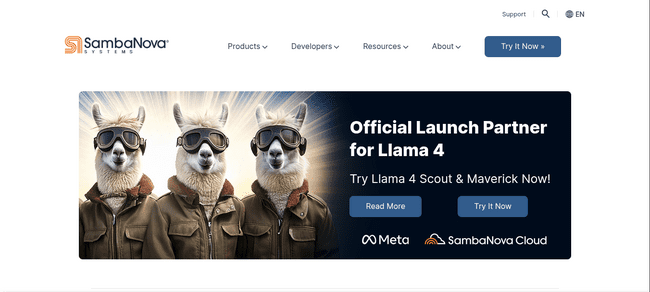
SambaNova Systems is pushing the boundaries of AI infrastructure with a purpose-built platform for large language models (LLMs) and complex AI workloads. At the core of its offering is the DataScale® SN40L system, a specialized hardware solution built around the company’s proprietary Reconfigurable Dataflow Unit (RDU). This system is engineered to deliver high-throughput inference with energy efficiency and a compact footprint.
The SN40L platform supports top open-source LLMs such as LLaMA, Qwen, and DeepSeek, enabling enterprises to deploy generative AI models with performance that approaches or exceeds current benchmarks in speed and efficiency. Its three-tiered memory architecture and dataflow design are optimized specifically for scaling agentic AI applications—those requiring autonomous decision-making capabilities at scale.Through its Cloud service, users can access the full capabilities of the platform without managing the underlying infrastructure. The company also offers AI Starter Kits to help developers prototype and deploy applications faster, bridging the gap between experimentation and production.
Founded in 2017 and based in Palo Alto, SambaNova has raised over $1 billion in funding from investors including SoftBank, Google Ventures, and BlackRock. Its platform is positioned to support high-performance AI deployments across research institutions, government, and enterprise environments.
3. Quantexa
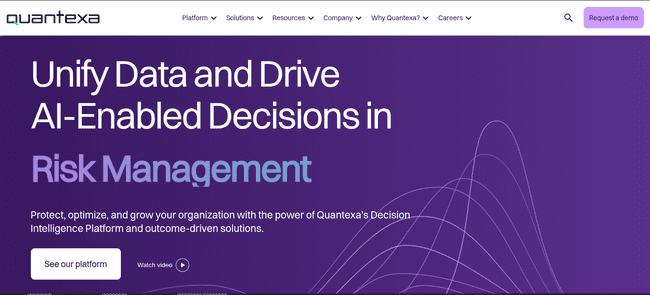
Quantexa, a London-based enterprise software company, has emerged as a leader in Decision Intelligence—a technology that contextualizes data to improve decision-making across large organizations. Its platform is widely adopted in financial services and expanding into sectors such as insurance, government, and telecommunications.
At the core of its offering is its Decision Intelligence Platform, which connects vast volumes of internal and external data to build a unified, entity-centric view of customers and counterparties. The platform automates data integration and applies AI-powered network analytics and entity resolution to uncover hidden risks and relationships. It supports key enterprise functions including fraud detection, anti-money laundering (AML), risk assessment, and customer intelligence. The platform has demonstrated measurable results. HSBC, for example, uses it to streamline data analysis and reduce case volumes by 60%, while enhancing risk oversight for 39 million customers. The platform’s scalability and compliance-ready design allow deployment across cloud, on-premises, or hybrid environments.
Founded in 2016, Quantexa has raised over $370 million in funding, with backing from Warburg Pincus and HSBC. The company continues to build tools that enhance trust in data and enable organizations to make high-stakes decisions with greater context and clarity.
4. Lighthouse
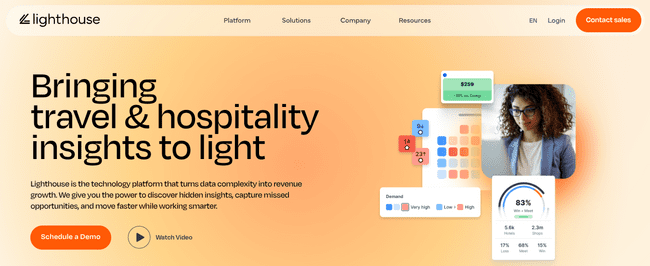
Lighthouse, formerly known as OTA Insight, provides a unified business intelligence platform for the global hospitality industry. Designed to support hotels and accommodation providers, the platform enables data-driven decision-making across pricing, demand forecasting, and performance optimization. At the core of their solution is their ability to integrate diverse datasets—including bookings, competitor pricing, demand signals, and event calendars—into a single dashboard. The system’s real-time insights help revenue managers anticipate market shifts and adjust pricing strategies with precision. Features such as Smart Compset and Rate Insight allow for competitive analysis and rate parity resolution across distribution channels.
The platform also supports large-scale portfolio management, offering tools to track and optimize performance across multiple properties. Clients report measurable benefits, including reduced rate disparity cases and increases in direct bookings. For example, some users have cited improvements of over 200% in direct booking rates after implementation. Trusted by hotel groups and independent operators alike, it offers flexible tools with an intuitive user interface and 24/7 global support. The platform’s emphasis on automation and actionable insights aims to reduce manual workloads and drive profitability.
Headquartered in London and serving clients worldwide, Lighthouse continues to expand its role as a data partner for the hospitality industry.
5. Isomorphic Labs
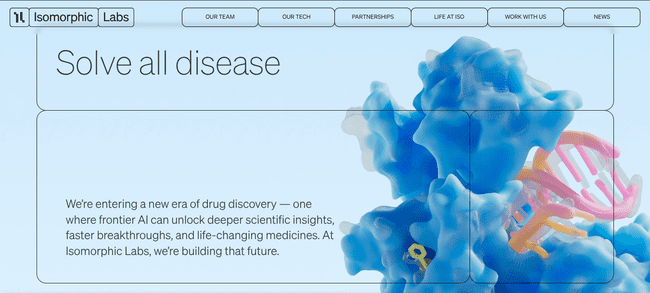
Isomorphic Labs, a subsidiary of Alphabet Inc. and sibling to DeepMind, is pioneering the use of artificial intelligence in drug discovery. Founded in 2021, the company builds on DeepMind’s breakthrough AlphaFold system to accelerate the development of new medicines through computational modeling of biological systems. At the core of its approach is the concept of “digital biology,” which treats biological structures and processes as information problems solvable by AI. Their research builds on AlphaFold’s ability to predict protein structures, extending into the development of generative and predictive models for molecule design and drug efficacy forecasting. This capability allows researchers to simulate and optimize drug candidates earlier in the discovery pipeline.
The company operates at the intersection of AI, biology, chemistry, and medicine, bringing together experts from each domain to build frontier models for applications such as ligand binding prediction, target identification, and multi-scale biological modeling. While the company has not yet announced commercial products or partnerships, it has signaled ambitions to accelerate drug development timelines and address complex diseases that remain poorly understood. Its mission aligns with broader efforts across Alphabet to harness AI for real-world impact in healthcare.
Isomorphic Labs is based in London and continues to recruit for interdisciplinary roles supporting its AI-driven pharmaceutical research.
6. Harvey
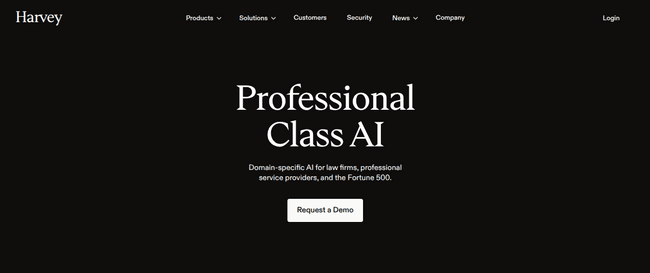
Harvey is a domain-specific AI platform built to support high-stakes industries like law, tax, and regulatory compliance. Trusted by top law firms and Fortune 500 companies, it enables professionals to offload complex tasks—from legal research to document analysis—using natural language prompts. The platform distinguishes itself through customized AI models trained specifically for legal, tax, and regulatory domains, offering reliable, expert-level outputs without the need for prompt engineering. Users can upload and analyze thousands of documents securely via Harvey Vault, with AI agents extracting, summarizing, and contextualizing critical information.
The company’s multi-model architecture supports collaborative workflows, where AI agents assist professionals in producing high-quality work products efficiently. The company emphasizes strong data privacy: client data is never used for training, and secure infrastructure ensures compliance with industry standards. Harvey’s strength lies in combining precision, scale, and usability. It transforms how legal and professional services teams handle research, drafting, and analysis—accelerating outcomes while reducing manual burden.
7. Graphcore
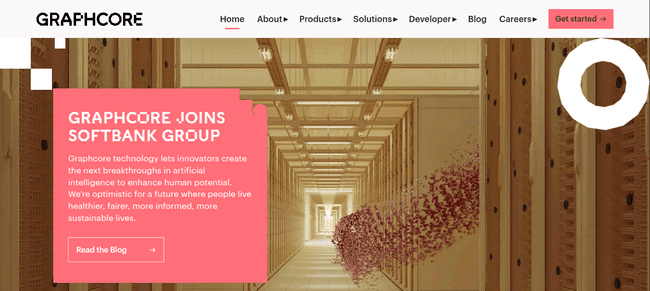
Graphcore is a UK-based AI hardware innovator known for its Intelligence Processing Unit (IPU)—a radically different kind of processor built specifically for machine learning workloads. Unlike GPUs and CPUs, the IPU is optimized for massive parallelism and fine-grained memory control, delivering significant performance improvements for training and inference of complex AI models. Its flagship software stack, Poplar®, integrates with leading frameworks like TensorFlow and PyTorch, allowing developers to easily port models and take full advantage of the IPU’s capabilities.
In 2024, the company joined the SoftBank Group, gaining strategic backing to expand its mission of accelerating global AI innovation. The company’s technology is already impacting sectors such as healthcare (e.g., drug discovery, genomics), finance (fraud detection, algorithmic trading), autonomous systems, and scientific research. The company also emphasizes ethical and sustainable AI development, aiming to empower industries while contributing to a more informed, fair, and healthier society. With its IPU technology and strong developer ecosystem, Graphcore is reshaping the AI hardware landscape and enabling breakthroughs that traditional processors can’t match.
8. Dropzone AI
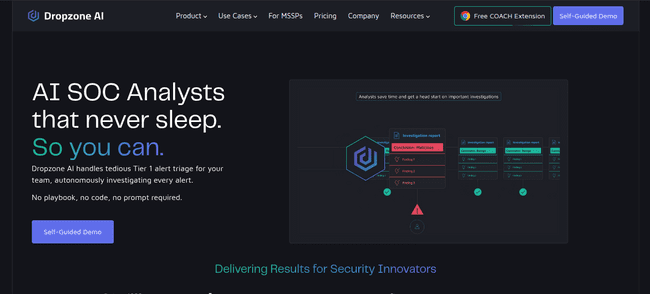
In an era of escalating cybersecurity threats and chronic analyst fatigue, Dropzone AI, a U.S.-based startup, is tackling the growing strain on Security Operations Centers (SOCs) with its autonomous AI analyst. Designed to investigate every security alert without requiring manual prompts, playbooks, or coding, the platform is gaining attention for its ability to augment human teams in real-time. Their core innovation lies in its ability to automatically triage and analyze Tier 1 alerts, operating continuously to ensure no incident goes unexamined. The system integrates with existing security stacks—including SIEMs—and produces detailed, explainable reports that enable analysts to validate results and take decisive action. A privacy-first architecture ensures submitted data, including emails, is deleted post-processing and not used for model training.
The platform is already in use by organizations such as Indiana Farm Bureau Insurance, Lemonade, CBTS, and Critical Insight. Reported outcomes include faster investigations, broader coverage, and improved focus on strategic security initiatives. In 2024, Dropzone AI achieved a notable milestone by emerging from stealth with $3.5 million in seed funding led by Decibel, according to publicly available investment data. As interest in AI-augmented cybersecurity tools grows, Its autonomous approach is drawing close industry scrutiny.
9. Skyfire
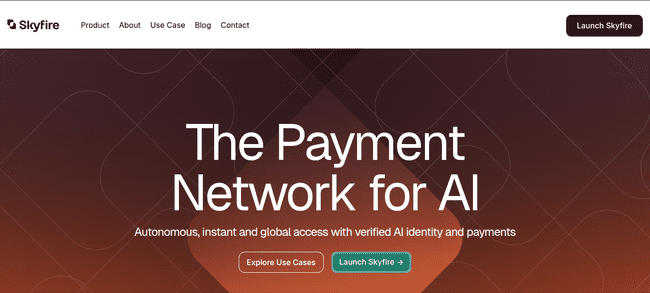
Skyfire is a technology startup building infrastructure to facilitate autonomous, instant, and global payments for AI agents. The platform empowers AI systems to independently pay, verify identity, and access digital services without human involvement, representing a foundational step toward AI-driven commerce. At its core, it offers an autonomous payment system that enables AI agents to execute transactions instantly and worldwide. A unique feature is its “Know Your Agent” (KYA) identity verification system, analogous to KYC in finance, which authenticates AI agents to ensure trust and security in these automated transactions. This verification also enables AI agents to create accounts and onboard themselves seamlessly to various services and APIs.
Their infrastructure supports a complete transaction flow: AI agents make service requests via APIs, undergo real-time identity and payment verification, and receive services automatically upon approval. This facilitates use cases such as autonomous subscription to API services, website monetization through AI payments, and frictionless access to critical data and tools. The platform’s approach aims to unlock new markets by enabling businesses to monetize services directly to AI agents acting as independent economic entities. Skyfire’s solution addresses emerging challenges in AI commerce by providing secure, scalable, and automated payment capabilities.

